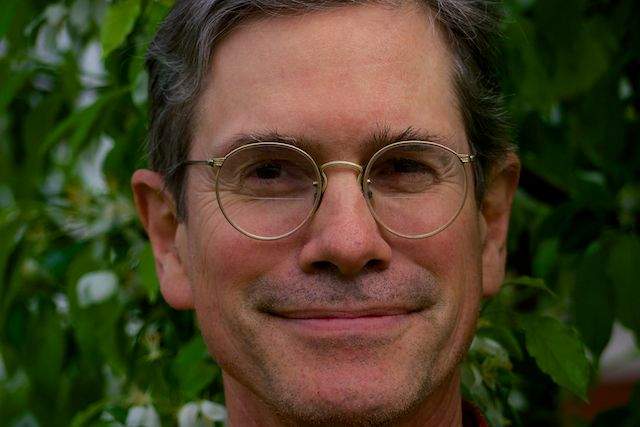
An Invocation of the 1950s…
So begins Ian Woollen's latest novel, Uncle Anton's Atomic Bomb. A multi-generational saga that sweeps across the second half of the twentieth century, and from Indianapolis, to Moscow, to an island off the coast of Maine, the novel takes more than a few pages out of the author's own life.
Not to worry, darling. Time behaves strangely in quantum physics and the human mind. Sit back, sip your drink, and allow words and phrases such as 'sock hop' and 'fallout', 'Studebaker,' and 'Red Scare' to summon up what images they will."
The second person address is somewhat unusual in contemporary fiction. But not in other settings. "If you were in a hypnotherapist's office," Woollen points out, "you would hear language very similar to that. That's pretty much a straight-up trance induction."
Woollen should know. As a practicing psychotherapist he's induced a trance or two. But being hypnotized can be useful outside of the therapeutic setting, argues Woolen the novelist. "Reading is a form of self-hypnosis," he suggests. "When we're reading a book, we're easing our way into a certain trance state, with language, and I thought I'd just kind of nudge that along."
Trust that your evening libation tastes pretty much the same in 1951 as it does today. And if you are a member of gen-whatever for whom the year 1951 has no reference point, imagine a period in American life when the term 'unwed mother' had a nasty sting.
Woollen wove what might be characterized as his roman à clef out of a long-held speculation that while his mother was teaching at the the English-speaking school in Moscow as a young woman in the early 1950s, she was actually working as a spy. The mystery of that chapter of his mother's life is expanded in the character of Mary Wangert, who's also keeping a significant secret on a personal level. Later in life, Mary Wangert goes back to school to become a therapist, a vessel of confidences in another form. But Mary Wangert is not the only character keeping secrets; the book is rife with them. "The role and function of secrets in family development, and in family dynamics," concedes Woollen, is "a key piece in the book".
The night that the Berlin Wall fell... I suddenly realized the enormous amount of tension that my whole generation had lived under for decades, that had had become invisible.
But the secret-keeping is compounded by context in Woollen's novel, which begins in the battened-down ‘50s. Woollen elaborates
I also try to evoke part of the experience of growing up in that era, and looking back and realizing all the larger social, and cultural and political secrets. There's a lot we didn't know. A lot of which started to come out in the 70s and 80s as far as CIA and some of their operational practices. So yeah, it's the impact of secrets, not just at the personal or family level but at the social level.
Over the course of four decades, Uncle Anton's Atomic Bomb explores the extent to which personal history can be interwoven with geopolitics. Woollen's own realization of how deeply connected those spheres were for him came in 1989
The night that the Berlin Wall fell I was working in Indianapolis and driving back to Bloomington, and the news came on the radio. I knew it was coming. I read the newspapers! It wasn't a surprise, but there was some very visceral impact about hearing that it had actually happened. And I had to pull the car over. I found myself sobbing, crying, and couldn't figure out, where is that coming from. I finally sorted it out and realized the extent to which the news of that event felt like the lifting or the end of the cold war in some way, and suddenly realizing the enormous amount of tension that I and we and my whole generation had lived under for decades that had become invisible. And it was only when it lifted that I could feel the intensity of it.
In Woollen's fictional post-Cold War denouement, we're not spared the bomb. But, as it turns out, it's launched from within. Is there a moral here?
"There is a moral," Woollen concedes, "but I'll keep that as a secret for the reader to discover."
Uncle Anton's Atomic Bomb has been named a Finalist for the Balcones Fiction Prize. Woollen's previous novels are Hoosier Life and Casualty and Stakeout on Millenium Drive, which won the 2006 Best Book of Indiana Fiction Award.






